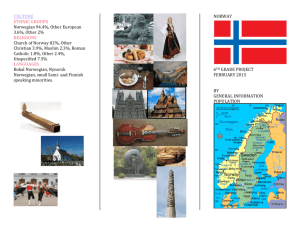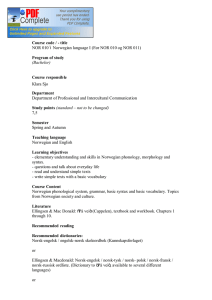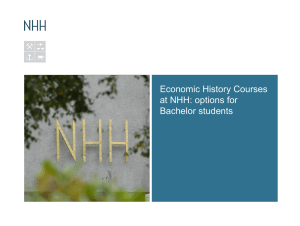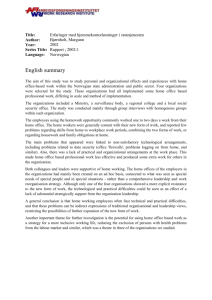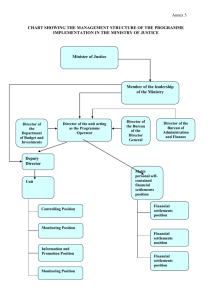Term test
advertisement
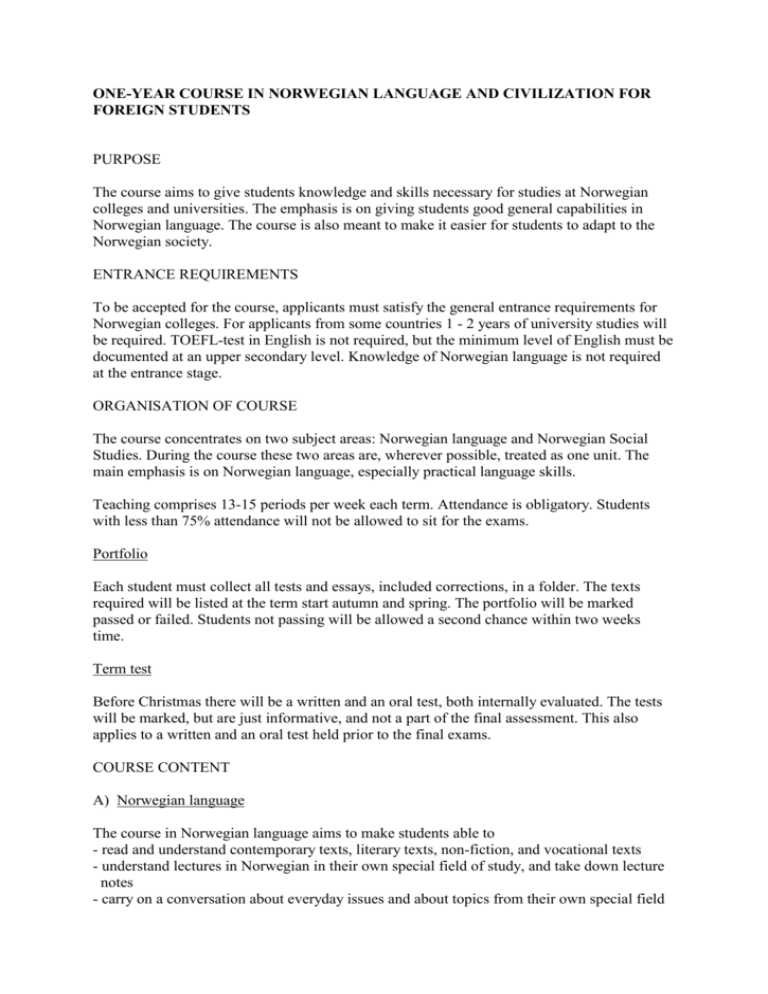
ONE-YEAR COURSE IN NORWEGIAN LANGUAGE AND CIVILIZATION FOR FOREIGN STUDENTS PURPOSE The course aims to give students knowledge and skills necessary for studies at Norwegian colleges and universities. The emphasis is on giving students good general capabilities in Norwegian language. The course is also meant to make it easier for students to adapt to the Norwegian society. ENTRANCE REQUIREMENTS To be accepted for the course, applicants must satisfy the general entrance requirements for Norwegian colleges. For applicants from some countries 1 - 2 years of university studies will be required. TOEFL-test in English is not required, but the minimum level of English must be documented at an upper secondary level. Knowledge of Norwegian language is not required at the entrance stage. ORGANISATION OF COURSE The course concentrates on two subject areas: Norwegian language and Norwegian Social Studies. During the course these two areas are, wherever possible, treated as one unit. The main emphasis is on Norwegian language, especially practical language skills. Teaching comprises 13-15 periods per week each term. Attendance is obligatory. Students with less than 75% attendance will not be allowed to sit for the exams. Portfolio Each student must collect all tests and essays, included corrections, in a folder. The texts required will be listed at the term start autumn and spring. The portfolio will be marked passed or failed. Students not passing will be allowed a second chance within two weeks time. Term test Before Christmas there will be a written and an oral test, both internally evaluated. The tests will be marked, but are just informative, and not a part of the final assessment. This also applies to a written and an oral test held prior to the final exams. COURSE CONTENT A) Norwegian language The course in Norwegian language aims to make students able to - read and understand contemporary texts, literary texts, non-fiction, and vocational texts - understand lectures in Norwegian in their own special field of study, and take down lecture notes - carry on a conversation about everyday issues and about topics from their own special field of study - speak Norwegian reasonably correctly with correct intonation patterns - write Norwegian without serious errors - read texts at normal speed In the first part of the course the main emphasis is on phonetics and grammar. Students are trained to understand spoken Norwegian and read fairly easy texts. Later, more emphasis is placed on vocabulary knowledge and on writing. Teaching methods will vary between lectures, group work, language laboratory exercises and homework. The language exercises will comprise textreading, role play, conversation and interviews, listening comprehension, dictation, report writing, grammatical exercises and essay writing, adapted to the content of the teaching and the skill level of the students. At regular intervals advisory testing will be carried out. Throughout the course students will have to read Norwegian language texts intensively as well as extensively. The teaching programme gives instruction in bokmål, but the students take an obligatory course (8-10 hours) that comprises language history, nynorsk and some Norwegian dialects. During the oral examination questions may be asked about the content of this course or fram a compendium of nynorsk texts which is a part of the course curriculum. B) Norwegian Social Studies The course in Norwegian Social Studies aims to give students the general overview they need when they begin their vocational studies. It is also meant to provide an insight into Norwegian social structures and the living conditions of Norwegians. Teaching in Social Studies has text reading as its basis, and is to the greatest possible extent co-ordinated with the teaching in Norwegian Language. Special emphasis is placed on orientation within the following aspects of Norwegian society: - the form of government the educational system trade and industry the social security system the language situation religion equal rights and migration co-operation with developing countries. C) Term Paper In the second term, students write a term paper on a given topic to be completed within 3 weeks. Students choose a topic within the field that they are going to study further. Students are given help with vocational and practical problems in connection with their term paper work. The paper should comprise about 15 data pages and comply with formal requirements. The term paper is one of tree exams and is graded pass/fail. The paper will be evaluated internally. CURRICULUM 1. An introductory course in Norwegian as a foreign language: Ellingsen og Mac Donald: På vei, 1999 (Cappelen) (Tekstbok og arbeidsbok) Ellingsen og Mac Donald : Stein på stein, 2000 (Cappelen) (Tekstbok og arbeidsbok) 2. One Norwegian grammar for foreign studentes, i.e.: Kirsti Mac Donald: Norsk grammatikk for fremmedspråklige (grunnbok og arbeidsbok) Cappelen 1999. 3. Phonetics Åse-Berit Strandskogen: Hva sier du ?, 1989 Oris 4. Social Studies Ellingsen og Mac Donald: Her på berget (Tekstbok og arbeidsbok). Cappelen 2002. The curriculum in Norwegian Social Studies is limited to about 100 pages of Norwegian non-fiction prose dealing with social and cultural aspects of life in Norway, especially in our own time. Texts may be taken from newspapers, periodicals, popularized scientific texts, etc. in addition to the textbook mentioned above. 5. Literature Gjernes og Arntzen: Sirkel (utdrag for HVO, 1998) Pensumtjenesten (a selection of about 100 pages). Saabye Christensen: Herman, 1988 (Cappelen) 6. Other workbooks/reference books: Kirsti Mac Donald: En gang til, arbeidsbok for viderekomne (Cappelen) 1993 Åse-Berit og Rolf Strandskogen: Preposisjoner og partikler i norsk. (Oris) 2000. Escolas ordbok (synonymordbok, bokmål) Golden, Mac Donald og Ryen: Norsk som fremmedspråk. Grammatikk. Universitetsforlaget 1991 EXAMINATION AND EVALUATION The following exams are taken at the end of the course and will be evaluated externally. - a written 6-hour examination concerning language and social studies. an oral examination. Questions are asked from the content of the curriuculum texts. In the calculation of the final mark the written examination count 2/3 and the oral examination count 1/3. The term paper and the portfolio assessment must be passed in order to get your certificate. When evaluating the exams the marks A – F will be used where E must be obtained in order to pass. NOTICE: Students without a permanent resident permit in Norway, cannot sit for another exam in Norwegian if the permit awarding you status as a student in your passport has expired (according to § 5.7 in The Guidelines for Exams at HVO). CREDITS Successful candidates of the One-Year Course for Foreign Students are awarded 60 credits in a combined college or university degree course.
